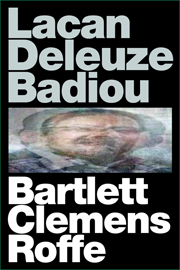1 - Introduction
Published online by Cambridge University Press: 05 September 2014
Summary
Neither people nor groups
We have written this book for four groups of people. The first are those new to the work of Alain Badiou, Gilles Deleuze and Jacques Lacan. These readers will find abstracts of selected concepts, directed exposition, and putatively helpful comparative discussion of these concepts as they range across the three authors. The second group includes specialised scholars of one or more of these figures. These will find ammunition here for their own preferences. For this book is not simply exegesis, but traces an ongoing philosophical war that the authors, attempting to follow the models of their masters, are continuing to fight against each other and themselves. The third group we address are those voyeurs who would like an aperture through which to enjoy the machinations of such theoretical confrontation. Whether tendentious, irritable, self-deceiving or aggressive, there may be choice selections of this text that will incite such readers to rage, terror or pity; or indeed to enthusiasm, complaisance and joy. The fourth group of addressees, finally, are we ourselves, the authors, who also simultaneously occupy the first three positions of amateur, professional and pervert. This book has been written to see if we could reconsider those thinkers and ways of thinking we find at once mystifying, titillating, precise, infuriating, disturbing – rendering them other to our own existing apprehensions and learned ignorance.
- Type
- Chapter
- Information
- Lacan Deleuze Badiou , pp. 1 - 8Publisher: Edinburgh University PressPrint publication year: 2014



